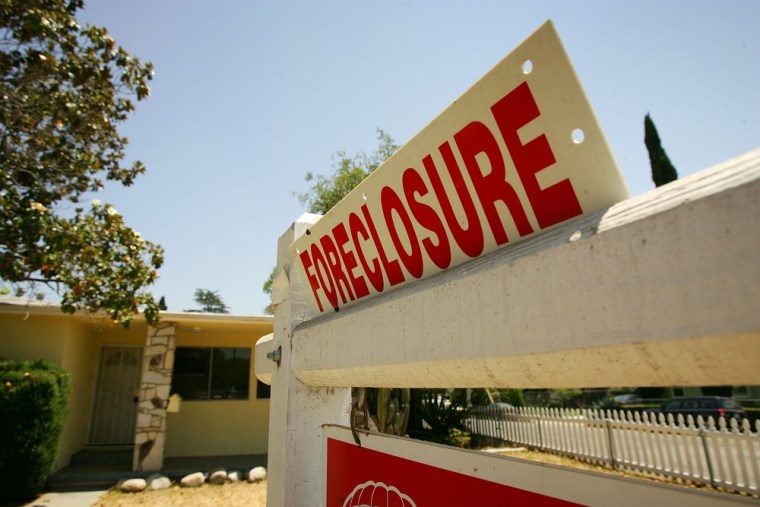Pity the poor Nevada homeowner. With home prices tumbling there at perhaps the fastest rate in the nation, it has become nearly impossible to get a handle on how much a home is worth. Why? Because appraisers, who base home values on comparable sales, have to depend on the plummeting target of “distressed” property sales that dominate in the state.
Nevada state Sen. Mike Schneider is trying to fight back with proposed legislation that aims to set a floor under prices, which have fallen well over 50 percent on average in the Las Vegas area over the past five years. A few months ago, he sponsored a bill proposing a radical new mandate for appraisers: Stop paying attention to those “distressed” sales. Legislators in other states and industry executives are watching closely.
The legislation's legality has been called into question because it runs counter to the Uniform Standards of Professional Appraisal Practice, the federal regulations home appraisers are required to follow.
Opponents — who include professional appraisers and their trade association, as well as some skeptical realtors — say there’s no way such a law can be worded that wouldn’t require appraisers to violate those regulations. This opposition persuaded sponsors of similar bills to abandon their campaigns in Maryland and Missouri. Likewise, action on another such measure is stalled in Illinois.
Nevada’s Schneider is soldiering on, however, crafting verbiage to replace his initially proposed distressed-property exclusion with a kind of “rounding up” mechanism by which appraisers could assign a higher value to a foreclosure. Paul Bell, president of the Greater Las Vegas Association of Realtors, acknowledges the challenge presented by federal guidelines but says lawmakers must try to legislate a reversal of what he calls an artificial devaluation of homes.
“We’ve had new home contracts fall out because the homes appraise for less than what it costs a builder to construct a property,” Bell says.
“Banks are just dumping properties, and there’s no relevance to the price,” Schneider says. “Those bulk sales should not be considered as true sales, and they should be adjusted in value in some way.”
“When people want to sell their homes, they’re going up against all these properties sold at fire sales,” says Illinois state Rep. LaShawn Ford, who introduced a foreclosure valuation bill in that state. It failed to survive an initial vetting in the legislature because of the conflict with federal appraisal standards, but Ford says he’s reworking the details to reintroduce a version in fall session. “I’m not going to give up on it.”
Leaving aside the question of whether these laws could be worded so they wouldn’t conflict with federal rules, appraisers say there’s also a serious logistical problem: In some parts of the country, the only houses selling are foreclosures. A law that excludes these would give appraisers no way to determine a home’s value.
In Sedona, Ariz., for example, only two out of about 1,000 sales last year were not distressed properties, says Richard Hagar, owner of American Home Appraisals in Mercer Island, Wash. A bill excluding these properties wouldn’t give him enough information to value a home or would force him to assign artificially high home values, he says.
“Distressed properties are the market,” Hagar says. “That is market value.”
Real estate data seems to back up this assertion. Sales of distressed homes accounted for 37 percent of all existing-home sales in April, according to the National Association of Realtors. Prices are still falling, with the median price of homes sold down 5 percent from a year earlier, according to the association.
Hagar said today’s prices, while painful for homeowners trying to sell or refinance, are an accurate reflection of the market. Also, consider the effect of recent federal tax credit programs that were aimed at bolstering the market but were suspected of falsely inflating prices. After the final credit expired, home sales dropped by 33 percent and a modest increase in prices quickly reversed.
Is there anything a homeowner can do besides despair as they watch their property values slide? Aside from long-standing advice to keep yards tidy and paint schemes neutral, there are a few things homeowners today should keep in mind.
A recent study conducted by the Department of Energy found that houses with a solar energy system sold for $17,000 more than comparable homes without them. If you’re going to install any “green” features, though, hold onto your old utility bills, which can give an appraiser a better idea of the enhancement’s value.
In addition, bigger bedrooms and bathrooms are more popular and therefore worth more than small ones, so don’t carve up your bedroom to add a walk-in closet. Generally, more bedrooms and bathrooms also command a premium, says Ken Chitester, spokesman for the Appraisal Institute, but converting your garage into a master suite is a wash: The two features are valued about the same.
